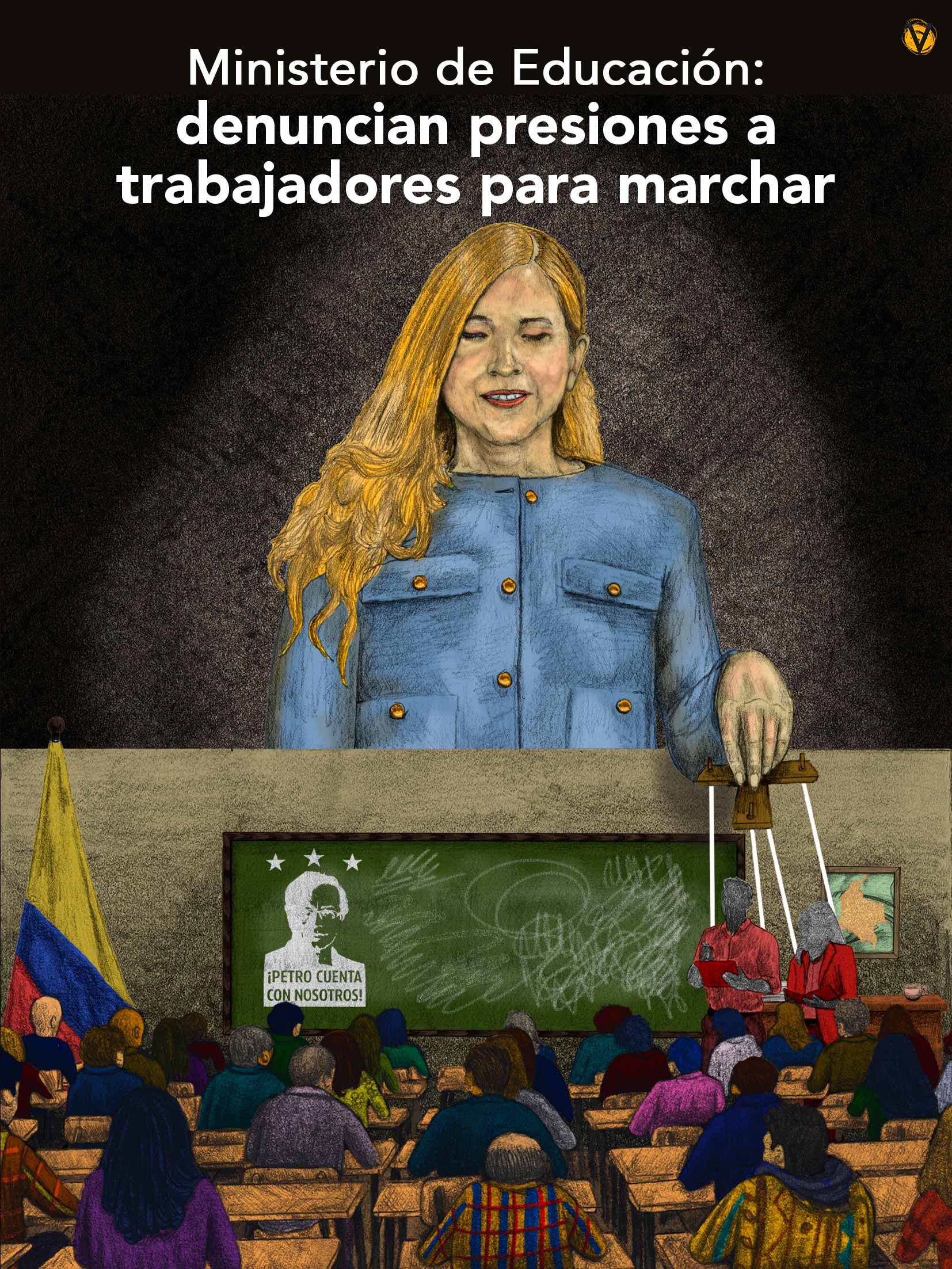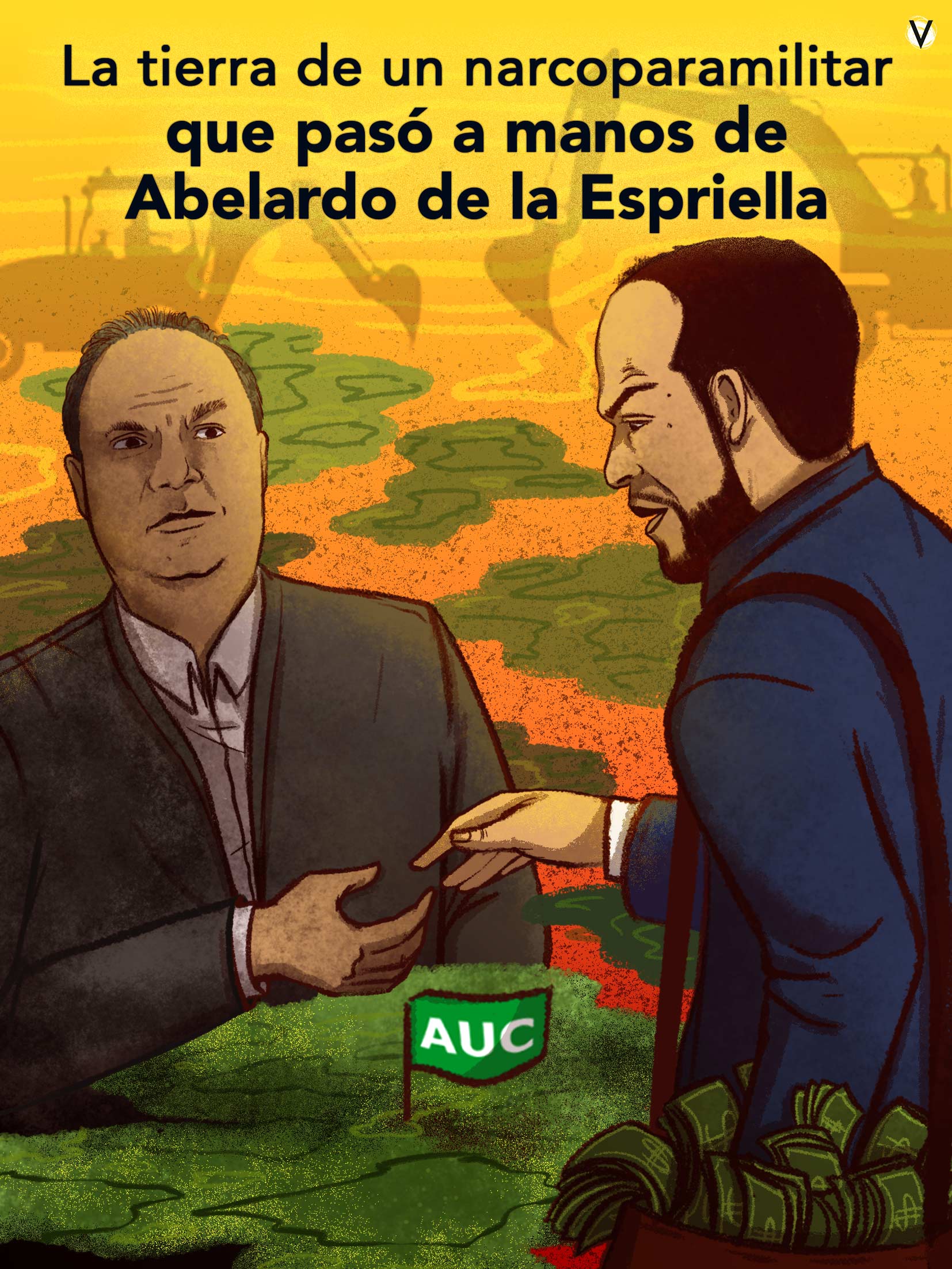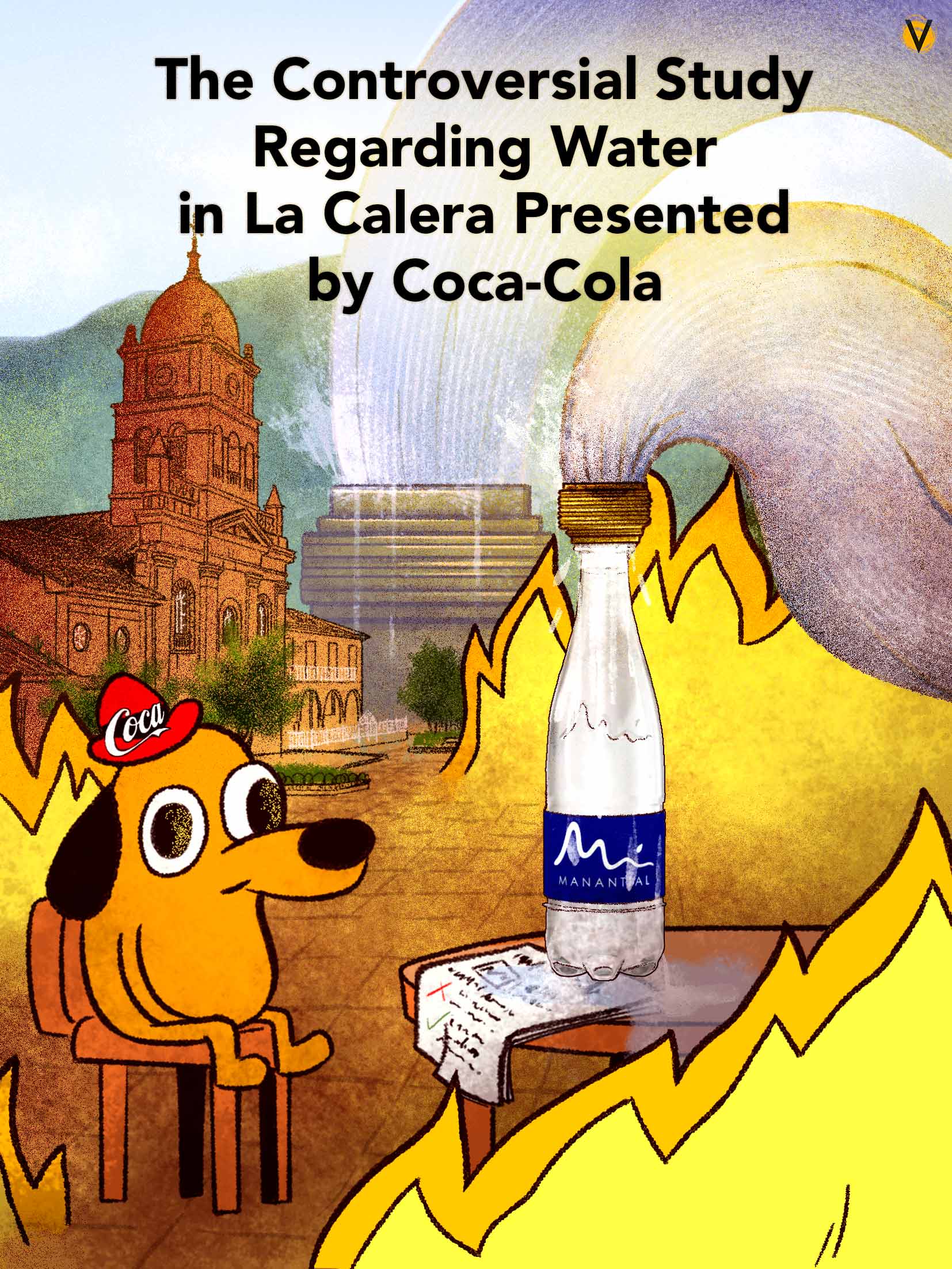A campaign proposal from Vicky Dávila that would favor her former bosses, the Gilinskis
15 de julio de 2025

Victoria Eugenia (better known as Vicky) Dávila has decided to champion nutrition as one of the central themes of her presidential campaign. “A clumsy tax like this one has to be stopped,” she posted on her X account, in a series of posts that proposed eliminating the 20% tax on ultra-processed products approved as part of Gustavo Petro’s tax reform.
Los colombianos quieren y necesitan que la comida sea más barata. Es una de sus mayores preocupaciones, es un clamor que he podido reconocer volviendo a recorrer el país. Acabemos con el impuesto a la comida procesada que es del 20% y se inventó en la tributaria Ocampo-Petro. https://t.co/Zry20t4lg3 pic.twitter.com/T5bCaiX9XK
— Vicky Dávila (@VickyDavilaH) April 6, 2025
Behind Dávila’s proposal lurks a clear beneficiary: the Gilinski Group, under the leadership of Jaime and his son Gabriel Gilinski. They are the Nutresa Group’s principal shareholders and the owners of the Zenú, Rica, Noel, Festival, Jet, and Chocolisto brands, as well as a long list of products that fit perfectly into the ultra-processed food category. They also own Grupo Semana, the same magazine that Dávila directed for four years before resigning in order to run for president. While still the magazine’s director, Semana published an economic proposal which they labeled “Vicky Dávila’s 10-10-10 Tax Plan”. The plan later became a pillar of Dávila’s campaign.
The ultra-processed food industry’s ties to political power are not new. As documented by VORÁGINE, several of these companies finance electoral campaigns in Colombia. “Around the world, industry is very powerful, but in this country it elects presidents, senators, representatives, all kinds of politicians,” stated nutritionist Juan Camilo Mesa.
To understand the viability of Dávila’s proposal, its possible consequences, and the interests surrounding it, VORÁGINE consulted with experts from different disciplines. As the 2026 presidential race heats up, emerging rhetoric is trying to apply a glossy coat of “public good” to what, at its core, could be a play on behalf of large corporate interests.
Hay que eliminar el impuesto del 20% que la reforma tributaria Ocampo- Petro le puso a la comida procesada. Está acabando con los bolsillos de los más vulnerables y quebrando a las tiendas de barrio. Ese impuesto a la comida para los colombianos es absurdo, inventos de este…
— Vicky Dávila (@VickyDavilaH) April 6, 2025
“Any politician or campaign that says they’re going to repeal these taxes is behaving in a populist manner. It’s a fabulous slogan, since nobody likes taxes, and anyone willing to join the fight against them is practically a national hero or heroine,” confirms Mylena Gualdrón, a nutritionist and coordinator of FIAN Colombia, an watchdog organization that monitors government implementation of legislation.
Ultra-processed Foods: Neither Cheap nor Good
One of Dávila’s main arguments for eliminating the tax is that Colombia, as a developing nation, needs food that is “cheap and good”. Dejusticia’s Adriana Torres, an expert in food and nutrition-related issues, says, “the truth is, this country needs more quality food at fair, accessible prices for both those who produce and consume them. To say that the country needs cheap food is to simplify the many dynamics of the dietary process.”
Dávila’s argument contradicts the tax’s central aim: to protect public health. Law 2277 of 2022 imposed a graduated tax on certain ultra-processed edible products —those to which sugars, sodium, or saturated fats have been added at levels that exceed the limits defined by the standard— as a measure to discourage their consumption. The reason? These products are directly associated with diseases such as obesity and diabetes, and with cardiovascular problems. According to the World Bank, 10.7% of Colombia’s adult population –3.4 million people– suffers from diabetes.
The regulation was a victory for social and health organizations that, for years, demanded urgent state intervention in line with the WHO recommendations. “Reducing ultra-processed foods is a public health message,” stated the WHO in September 2024.
But the debate is not only technical; it’s also semantic. One of the most effective disinformation strategies is the way these products are referred to. Dávila calls them “good food” or simply “processed,” in an attempt to soften their real impact. For Mylena Gualdrón, this is distorting the language and, therefore, the debate: “When you look at an ultra-processed food and try to identify the real food in it, you can’t find it. It has lost its food matrix. It’s not correct to call them food; they’re just a combination of additives.”
The difference is also categorical. At one extreme is real food, such as fruits, vegetables, legumes, meats, and eggs, which are fresh or minimally processed foods that retain their nutritional properties. At the other extreme are ultra-processed foods, industrial products made from refined ingredients, extracts, preservatives, and colorings. “They are poor-quality formulations, with an excess of many bad ingredients,” Gualdrón summarizes.
Between these two extremes are processed foods, which have been transformed but still retain their nutritional value and structure. In this sense, confusing “processed” with “ultra-processed” is not a minor technical error, but a strategy that dilutes the urgency of the problem. The first are not taxed, the second are, with some exceptions.
“Depending on the amount of critical nutrients they contain (sodium, sugars, or saturated fats), the product will be taxed to a greater or lesser extent. It seems that all ultra-processed foods are lumped together, ignoring the fact that the tax is designed specifically to address critical nutrients,” explains Adriana Torres.
Furthermore, the “cheap” argument doesn’t entirely hold up. According to nutritionist Juan Camilo Mesa, foods produced agriculturally are often cheaper than many ultra-processed foods, even though they are more vulnerable to the fluctuations of inflation.
The Industry that “Legislates” to Avoid Being Regulated
For years, the ultra-processed food industry has perfected a strategy to avoid regulation: sitting at the same table where the standards are written. In Colombia, as in many countries, it isn’t uncommon to find politicians acting as representatives of corporate interests, even when this means ignoring scientific evidence and public health arguments.
According to Gualdrón, the industry’s role around the world has never been good. For years its discourse was that they self-regulated, and so they refused to accept regulations, he says. In Colombia, this debate has been going on for more than 15 years. And all the while, corporate sectors have put up barriers, exerting pressure to dilute, delay, or outright block initiatives that seek to protect the right to food security.
“These industries interfere in public policy, and governments have a responsibility to not allow that interference. That’s part of what has historically happened in Colombia: the regulator and the person facing regulation are seated at the same table,” says Carolina Piñeros, director of the Red Papaz organization.
Maintaining a clear distance between economic powers and decision-makers is therefore not an ideal, but a necessity. When these boundaries blur, conflicts of interest flourish. The case of Vicky Dávila and her close ties to the Gilinski Group is an example. In a recent interview for W Radio, when asked about her relationship with the businessmen, Dávila responded bluntly: “If I ever need to ask Gabriel Gilinski for help, I hope he’ll give it to me. I’m sure he can give it to me.”
In Colombia, the Nutresa Group, one of the country’s leading food producers, is at the center of this intrigue. On April 2nd, Jaime Gilinski acquired a 100% interest in Nugil, a key company within the Nutresa corporate machinery. As part of this transaction, Gilinski became the owner of 84.5% of the group and, in January, also assumed the presidency. According to Forbes, Gilinski is currently the richest man in Colombia.
Nutresa owns 29 brands with a presence in the country, including 25 that produce ultra-processed foods subject to the so-called “health tax.” Add to this Gilinski’s announcement that he will acquire 40% of Yupi, the manufacturer of products such as Rizadas, Golpe con Todo, Lizas, and Tosti, all subject to this tax. Without a doubt, any reduction or elimination of the tax would reduce the Gilinskis’ out-of-pocket expenses.

What About the Most Disadvantaged?
One of Vicky Dávila’s most persistent arguments for eliminating the tax on ultra-processed foods is that “they are taking a toll on the wallets of the most vulnerable and bankrupting neighborhood stores.” This she claimed without backing it up with any source.
The claim is not new; opponents of the tax have repeated it for years. Nutritionist Juan Camilo Mesa sees it differently: The tax benefits the entire population, especially the low-income individuals who constantly consume ultra-processed foods.
“The most vulnerable populations are the most affected by these types of products. This includes children, adolescents, and people from impoverished socioeconomic backgrounds.
These same populations are also the most prone to illness and have limited access to healthcare,” he points out. In fact, he says, it impacts their life expectancy.
Studies show a correlation between the increased consumption of ultra-processed foods and chronic disease. For example, the leading cause of death worldwide is cardiovascular disease, which in many cases is preventable through diet. “These diseases are going to reduce people’s life expectancy at a time when the opposite should be the case, given all the advances in medicine,” Mesa says.
When the tax was approved, the then Minister of Finance, José Antonio Ocampo, explained that the taxed products only represent 3% of the “family food basket”. To date, no serious study has demonstrated any significant impact produced by the tax on low-income households. In fact, international experience suggests the opposite: when junk food becomes more expensive, people shift to healthier foods if the environment allows it.
“There’s a very risky narrative in trying to eliminate the tax because it affects vulnerable communities, which implies that people without resources have to eat junk food. “It’s very sad, because they are precisely the ones most in need of an environment where they can easily consume fruits and vegetables,” explains Carolina Piñeros of Red Papaz. In fact, in Colombia, 30% of the population still consumes fewer than two meals a day, according to Colombia’s Department of Statistics (DANE).
The industry could even prevent fluctuations in demand for its products. “An industry that is making huge profits, and is afraid that a price increase will reduce those profits, could decide to pay the tax and not transfer the cost to the consumer by increasing prices,” says Ximena Cadena, deputy director of FEDESARROLLO.
Another of the anti-tax discourses cites neighborhood stores. According to Dávila and the National Federation of Merchants (FENALCO), the tax is bankrupting these shops. In March 2025, the organization presented the results of a survey in which 82% of shopkeepers reported seeing a decrease in sales. Based on this information, FENALCO claimed that the “store crisis is worsening significantly.” But the numbers don’t add up: they surveyed only 464 of the country’s 450,000 shopkeepers. Less than 0.1%.
Hawen Zhang, a statistics expert, analyzed the FENALCO survey and found multiple problems: the sample only included shopkeepers affiliated with its Fenaltiendas program, did not represent all shopkeepers in the country, and was based on perceptions without concrete information about closures or economic losses.
In addition, FENALCO omitted a possible cause of the shopkeepers’ crisis: the rapid and massive emergence of retail chains such as D1, Ara, and Oxxo. “These businesses have access to other services and technologies, and it’s difficult to compete with their logic and prices,” Gualdrón explains. An investigation by Colombia’s Central Bank reports that shopkeepers’ income is declining due to increased competition from stores offering lower prices. Shopkeepers are struggling to compete with lower-priced products and better infrastructure.
Adriana Torres believes it’s important to bear in mind that shopkeepers don’t just sell ultra-processed foods; they also offer real and processed foods. And not all of the ultra-processed foods they sell are subject to the tax. The regulations exclude products such as sandwiches, corn arepas, artisanal sausages, and others.
The real problem lies elsewhere: while ultra-processed foods are rising in price in a controlled manner, real foods, those that truly nourish us, are being hit hard by inflation. Ultra-processed foods increase in price at a much lower rate than real foods. This is because these foods are impacted by dynamics such as climate change, transportation, global inflation, and consumables. Ultra-processed foods can handle these factors differently because they have more efficient distribution networks and don’t damage easily,” says Torres.
A Tax with a Social, not Fiscal Objective
For journalist Vicky Dávila, the tax on ultra-processed foods is “absurd,” a mere “invention of this government to collect money they’ve already spent.” However, the tax was not created as a mechanism to fill State coffers.
Mylena Guandrón explains: “The tax is not only intended to create a barrier to buying the products, but also to relieve the burden their consumption creates on the healthcare system.” This type of tax breaks with traditional logic: it doesn’t seek to maximize revenue, but rather to minimize damage. However, the social benefit of reducing disease is still difficult to measure.
It’s no secret that Colombia needs more fiscal resources. Ximena Cadena of FEDESARROLLO assures that it has been difficult to generate this revenue from taxes. In 2024, the National Tax and Customs Directorate (DIAN) reported that the revenue from this tax totaled 2.2 trillion pesos: 288 billion for ultra-processed sugary drinks and 1.9 trillion pesos for ultra-processed solid foods. In other words, around 1% of all taxes collected in the country.
The revenue in this case is earmarked for the healthcare system and for treatment of diseases caused by the consumption of ultra-processed foods. As Carolina Piñeros, director of Red Papaz, says, “nothing is being prohibited; ultra-processed products can be sold, but with the proper information. We mustn’t forget that these are public health measures, and one of the most effective ways of achieving their aim is through promotion and prevention.”
The State’s Duty
Vicky Dávila argues that the State cannot be expected to act as a nanny. However, when it comes to people’s right to health, it isn’t a question of paternalism: the State is fulfilling a constitutional obligation and a commitment made at the international level.
The WHO is telling countries they should implement public policies to restrict the consumption of ultra-processed foods because people are not fully independent in their decision-making around diet. “Today’s environment forces us into terrible decisions. Those who make the best decisions do so because they have access to privileged information or are more educated.
“We need to change the environment,” says Carolina Piñeros of Red Papaz.
The WHO is making four requests of states: implementation of front-of-package labeling, regulation of advertising for these products, taxation to discourage their consumption, and comprehensive public policies to minimize their impacts. Colombia has so far met two of these requirements.
And it hasn’t been easy. The legislation on ultra-processed foods passed amid strong political and business pressure. But once approved, the Constitutional Court shielded it. Court Ruling C-435 of 2023 was categorical: these products are harmful and their taxation is a legitimate and constitutional measure.
Experts consulted agree that eliminating or weakening this tax would be a serious setback, both technically and symbolically. “Weakening or undermining taxes would be a step backwards from the narrative we’ve worked so hard to achieve: anything with a seal is ugly, or is associated with risk,” reflects Mylena Gualdrón.
For Ximena Cadena, deputy director of FEDESARROLLO, the tax represents an advance in the collective conscience: “The fact that the tax was approved and created shows that society has become aware that this is important.”
Urgently Needed Comprehensive Policies
Vicky Dávila concludes her argument by stating the need for campaigns to promote healthy eating and exercise. There is consensus among experts on this.
Juan Camilo Mesa believes all these measures work together, none independently of the others.
“Taxes alone are not enough; we need structural policies that guarantee access to real food.
The tax is one of a series of policies that interact with each other, but on its own it won’t solve Colombia’s nutritional crisis,” says Adriana Torres.
The tax has been in place for less than three years and it is still too early to accurately measure its impact. It will take at least five years to judge its effectiveness. Meanwhile, Red Papaz insists on the urgent need to intervene on the other side of the problem. The prices of some real foods make them difficult to access for certain population groups. Incentives and even subsidies are needed to increase consumption.
The Dejusticia expert also sees elimination of the tax as a step backward, as it sends the message to society that “these unhealthy products are a nutritionally adequate option when in reality they are not.”
FIAN Colombia warns of the need for INVIMA (Colombia’s Food and Drug Administration) to effectively monitor the current measures to ensure that they are at least being implemented appropriately. And, in addition, a real commitment on the part of industry. “We’re telling them: ‘don’t put people’s health at risk and don’t damage the health of communities with your products,'” Gualdrón asserts.
Juan Camilo Mesa is adamant: “The ultra-processed food industry is no one’s friend. They care nothing about people’s health. They are only interested in making a profit and cleaning up their image. So who are our friends? Rural communities.”
* This investigation was funded, in part, by Vital Strategies. The content is editorially independent and is intended to shine a light on illegal or unethical practices in the food and beverage industry and on the fact that it is the most vulnerable populations who disproportionately bear the brunt of the health crisis caused by the consumption of unhealthy food and beverages. Unless otherwise noted, all statements published in this story, including those regarding specific legislation, reflect the views of the particular organizations, and not of Vital Strategies.




